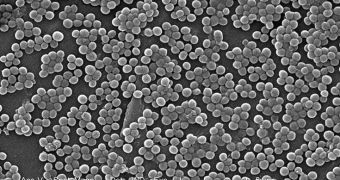Lately, experts have taken a keen interest in fighting antibiotic-resistant strains of bacteria. These microorganisms can easily kill adult humans, and ironically they can be found in abundance on hospital equipment. But scientists are zeroing in on ways to kill them.
In a new research, researchers in the United Kingdom, at the University of Southampton, demonstrated that destroying methicillin-resistant Staphylococcus aureus (MRSA) is possible by using copper.
During a live broadcast yesterday, April 4, the team demonstrated that the spread of this dangerous microorganism can be stopped with antimicrobial copper. The finding could be of tremendous use for hospitals. These institutions constantly lose patients to pathogen infections.
Some of the most dangerous organisms in hospitals include Pseudomonas aeruginosa, a bacteria that can cause sepsis, and that can kill if it infects major organs such as the kidneys or the lungs.
Tuberculosis, Clostridium difficile (which causes diarrhea and intestinal diseases) and Stenotrophomonas maltophilia (which causes severe infections of the urinary and respiratory tracts), are also common pathogens.
But the British team managed a feat that has never been done before, when they were able to stop the spread of MRSA. Existing antibiotics cannot harm the bacteria, which has developed its own defense mechanisms against the attacker.
During the broadcast, it only took a few minutes for the copper to completely eradicate a colony of MRSA bacteria. The battle was imaged using an advanced type of fluorescent microscopy.
“Bacteria such as MRSA can survive on ordinary surfaces like door handles, taps and grab rails for days, even months, and be transferred on hands, spreading bacteria to other surfaces or to patients,” explains Bill Keevil.
The expert, who holds an appointment as the Director of Environmental Healthcare at the University of Southampton, is also a professor and the leader of the new experiments, Science Blog reports.
“As more resistant bacteria emerge, we’re running out of drugs to treat the infections they cause, so we need to do everything practicable to prevent their spread,” he goes on to say.
“Copper is a powerful antimicrobial, which quickly and continuously reduces the number of bacteria on its surface. We’ve demonstrated it here, in the lab, and it’s also been shown to be effective in busy clinical environments as part of a set of infection control procedures,” the expert argues.
This investigation is tremendously important because more than 7 million people around the world contract a hospital-associated infection each year. Of those, nearly 37,000 individuals die.
“Changing common touch surfaces in hospitals to copper can help break the chain of infection, leading to a more hygienic environment, which must have a positive impact on the well-being of patients, even in the face of antibiotic-resistant bacteria,” Keevil concludes.

 14 DAY TRIAL //
14 DAY TRIAL //